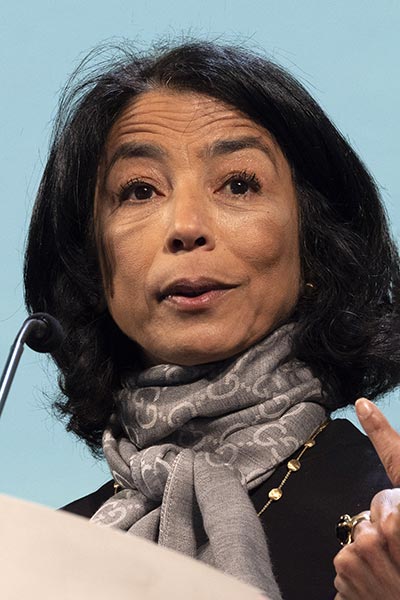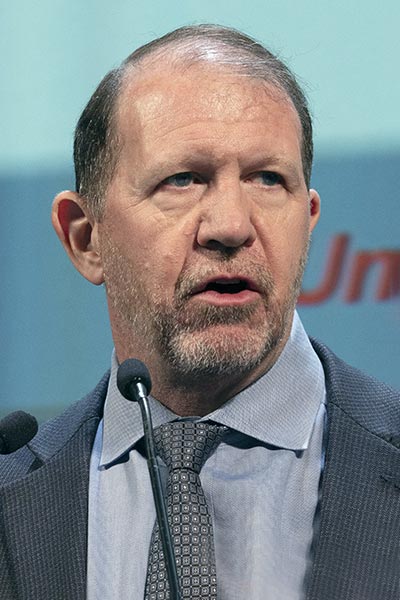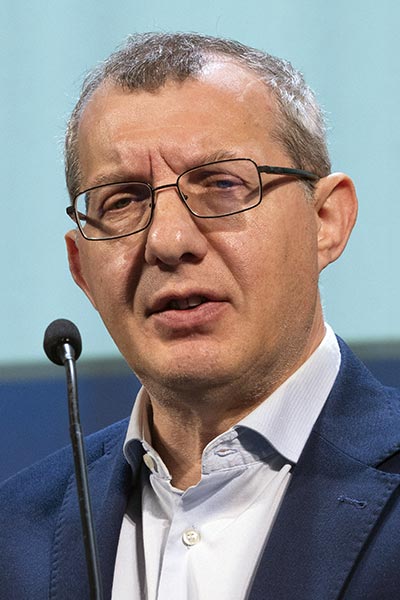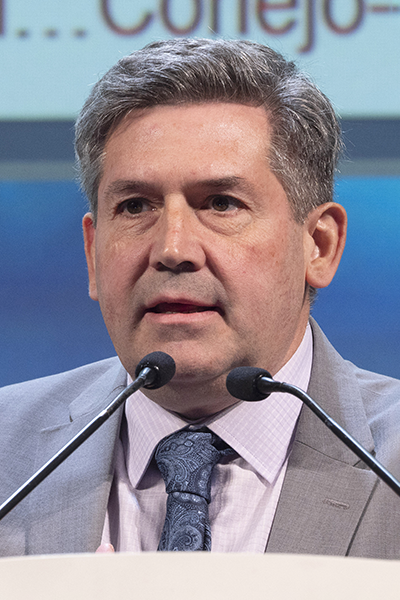Cancer immunologists are gaining new insights into the complexities of immune ecosystems
As immunotherapy continues to revolutionize cancer treatment, researchers are gaining novel insights into the nature of cancer immune responses and developing therapeutic strategies to stimulate anticancer immunity.

During the plenary session Embracing Immune Ecosystems, a panel of cancer immunologists discussed some of the latest discoveries that are driving advances in cancer immunology research and therapeutic development. The session can be viewed on the virtual meeting platform by registered Annual Meeting participants through July 19, 2023.
Miriam Merad, MD, PhD, Director of the Precision Immunology Institute at the Icahn School of Medicine at Mount Sinai, discussed research efforts to target myeloid cells, including new discoveries of myeloid cell types that significantly impact cancer biology.
“All inflammatory lesions, including cancer lesions, are characterized by enhanced production of myeloid cells in the bone marrow. They are released in the blood and accumulate in the inflammatory lesions,” Merad said. “Unfortunately, despite their key role in tumor immunity, the molecular features of tumor-associated dendritic cells and macrophages are not well known.”
There has been progress, however. Recent findings from Merad’s lab and others have helped identify sites of myeloid dysfunction, suggesting potential immuno-oncology targets.

Florent Ginhoux, PhD, Senior Principal Investigator and Laboratory Director at Gustave Roussy in France, explored recent breakthroughs that have helped researchers gain a better understanding of the biology of tumor macrophage heterogeneity.
Studying tumor-associated macrophages in pancreatic ductal adenocarcinoma, researchers showed that monocyte-derived tumor-associated macrophages can be separated by stage of differentiation, developmental relationship, transcriptomic state, function, and localization.
“There remains a crucial need for an ontogeny-resolved and spatiotemporal definition of tumor-associated macrophages,” Ginhoux said. “Such complexity needs to be embraced, as it represents real opportunities for new therapeutic targets.”
Dario A. Vignali, PhD, the Frank Dixon Chair in Cancer Immunology and Distinguished Professor at the University of Pittsburgh School of Medicine and Hillman Cancer Center, focused on LAG3, a new type of immune checkpoint inhibitor. The first LAG-3 immune checkpoint inhibitor combination has recently been approved by the U.S. Food and Drug Administration.

Immunotherapies targeting the PD-1/PD-L1 pathway have had a major impact on cancer treatment. However, only a portion of patients respond, and an even smaller portion exhibit a long-term, durable cure.
“LAG3 is one of a cohort of inhibitory receptors (IRs) that are chronically expressed on exhausted T cells in cancer and chronic viral infections,” Vignali said. “Lack of response to IR blockade therapy and increased disease burden has been associated with circulating, peripheral CD8-positive T-cell exhaustion, which is defined by poor T-cell function linked to increased IR expression.”
Vignali showed that in a phase II clinical trial in metastatic melanoma patients, combination treatment with PD-1 and LAG-3 inhibitors resulted in enhanced T-cell receptor signaling, IFNg signaling, and cytotoxicity of CD8-positive T cells, while they retained exhaustion signatures.

Gianpietro Dotti, MD, Professor of Microbiology and Immunology at the University of North Carolina and Co-leader of the Immunology Program at the UNC Lineberger Cancer Center, discussed new discoveries related to the latest generation of CAR T cells.
Chemokines released within the tumor microenvironment can attract immune cells expressing matching chemokine receptors. Recent findings have shown that researchers can express chemokine receptors in CAR T cells, and that exploiting these interactions may improve the migration of T cells to solid tumors, including brain metastases.
Studies by Dotti and colleagues have shown that CAR T cells expressing the chemokine receptor CCR4, the ligand of which is secreted by Hodgkin lymphoma cells, improves the recruitment of CAR T cells into lymphoma tumors in mice and in patients, with promising efficacy.
“Our preliminary data suggest that the combination of the CAR and chemokine receptor shows more activity at lower CAR T-cell doses,” Dotti said. “We believe that exploiting this mechanism could help have better antitumor activity in solid tumors and in solid tumors with brain metastases.”

Jose R. Conejo-Garcia, MD, PhD, Associate Professor of Immunology at the Duke University School of Medicine and Duke Cancer Institute, discussed a novel role of IgA antibodies that may give rise to new immunotherapeutic approaches.
“We have seen that mutated oncodriver-specific dimeric IgA (dIgA) penetrates human cancer cells, specifically neutralizing oncogenes inside the tumor cell,” said Conejo-Garcia. He and his colleagues demonstrated that when engineered dIgA molecules bind to another protein called PIGR, the complex can enter the cell and inhibit cancer-driving proteins such as KRASG12D and IDH1.
Further, the oncoprotein-bound antibody complex is processed through the cell’s sorting machinery and expelled, effectively eliminating the driver protein from the cell, an effect that is not restricted to oncoproteins located near the cell membrane.
“These and other findings suggest that intracellular antigens can be specifically and effectively targeted inside epithelial cancer cells through PIGR-based interventions, paving the way for a new generation of immunotherapeutics.”
More from the AACR Annual Meeting 2025
View a photo gallery of scenes from Chicago, continue the conversation on social media using the hashtag #AACR25, and read more coverage in AACR Annual Meeting News.

